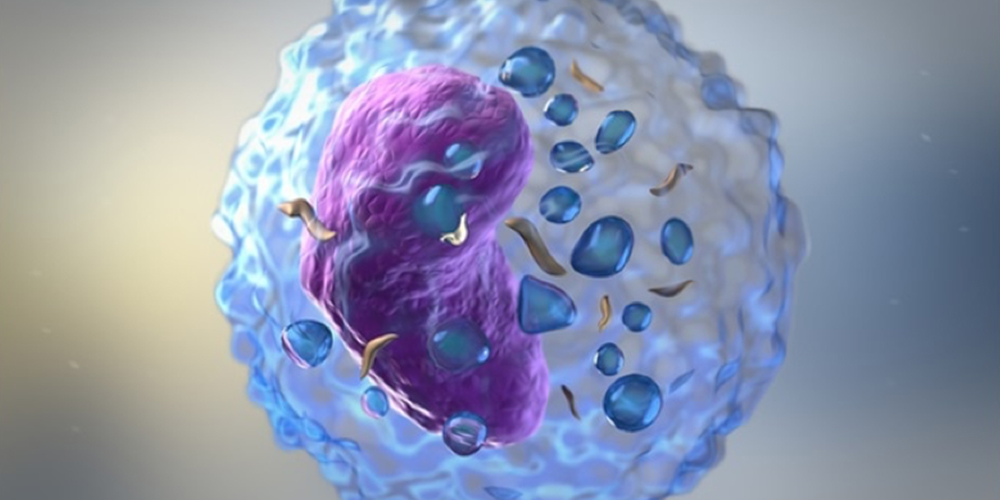
09:07 6th May 2019 | PGT
The human leukocyte antigen (HLA) system (the major histocompatibility complex [MHC] in humans) is an important part of the immune system and is controlled by genes located on chromosome 6. It encodes cell surface molecules specialized to present antigenic peptides to the T-cell receptor (TCR) on T cells. These are proteins that help the body's immune system tell the difference between its own cells and foreign, harmful substances. Although most HLAs protect your body from harm, HLA-B27 is a specific type of protein that contributes to immune system dysfunction. The presence of HLA-B27 on your white blood cells can cause your immune system to attack those otherwise healthy cells. When this occurs, it can result in an autoimmune disease or immune-mediated disease, such as Juvenile rheumatoid arthritis or Ankylosing spondylitis; many other disorders involving abnormal immune function and some forms of cancer have also been associated with specific HLA alleles.
Genomic Organization of the HLA System
The human major histocompatibility complex (MHC) maps to the short arm of chromosome 6 (6p21) and spans appropriately 3600 kilobases of DNA. The human MHC is divided into three regions
Class I region: contains the classical HLA-A, HLA-B, and the HLA –C genes that encode the heavy chains of class 1 molecules
Class II region: Consists of a series of sub-regions, each containing A and B genes encoding alpha and beta chains respectively
Class III region: Does not encode HLA molecules but contains genes for complement component (C2, C4, factor B), 21- hydroxylase, tumornecrosis factors (Txpresion of NFs) and some others
Expression of HLA
HLA class I molecules are expressed on the surface of almost all nucleated cells. Class II molecules are expressed only on B lymphocytes, antigen-presenting cells (monocytes, macrophages, and dendritic cells) and activated T lymphocytes.
Associated Diseases of HLA
Certain diseases, especially of autoimmune nature, are associated with particular HLA types viz:
Preimplantation Genetic Diagnosis (PGT) and HLA Matching
In some diseases requiring hematopoietic stem cell transplantation, preimplantation genetic testing (PGT) may be used to give rise to a sibling with matching HLA, although there are ethical considerations.
PGT for HLA matching is used to select the embryo of a HLA tissue type compatible with that of a child who is in need of a bone marrow transplant. It can be performed in conjunction with a single gene disorder if needed, in order to recommend embryos that are both HLA-matched to an affected sibling and free of the inherited condition like leukemia, and certain blood disorder, including beta-thalassemia, sickle cell disease, Fanconi anemia chronic granulomatous diseases, Diamond–Blackfan anemia, schwachman diamond syndrome and hyper IgM.
PGT Procedure Used in Testing For HLA
During the PGT set-up process, the linked markers are determined for each individual in the family using blood or cheek swab samples. These markers are then compared between parents and children to determine which linked markers were inherited in the child needing an HLA match (and which linked markers would be seen in an HLA-matched embryo).
It is important to know that approximately 6-7% of children may be HLA recombinant. This implies that a child has not inherited a complete HLA copy from one or both parents, which is a result of the natural process of recombination (crossing over of genes). Unfortunately, if a child is an HLA recombinant, there is essentially no chance of finding an embryo that is a complete HLA match. The stage at which we would determine whether or not a child is a HLA recombinant will depend on the particular situation including prior HLA typing, number of children, and availability of your child’s grandparents to submit a DNA sample.
Over the past decade, considerable progress has been made towards improving the outcome of related and unrelated donor transplant. Advances have been made in HLA typing, particularly in allelic matching, transplant conditioning, graft –versus – host disease prophylaxis and supportive care, allowing for recipients of all various hematopoietic stem cell transplants to be more likely to survive then in previous years.
Conceiving a healthy child that is HLA matched to their sibling gives parents an opportunity to act independently to save their sick child, and at the same time they can be assured that other siblings will be free of such genetic disorders.
References
To find out about how Bridge Clinic conducts this procedure, contact Nigeria’s most fertile fertility centre today.
Email: enquiries@thebridgeclinic.com
Call: 01 631 0092 / Whatsapp: +234 (0)810 460 7791.
Visit: 66 Oduduwa Way, Ikeja GRA
Search by condition, treatment or keyword and conveniently browse our informative articles
Book an appointment online or search for a clinic close to you.
Book an Appointment